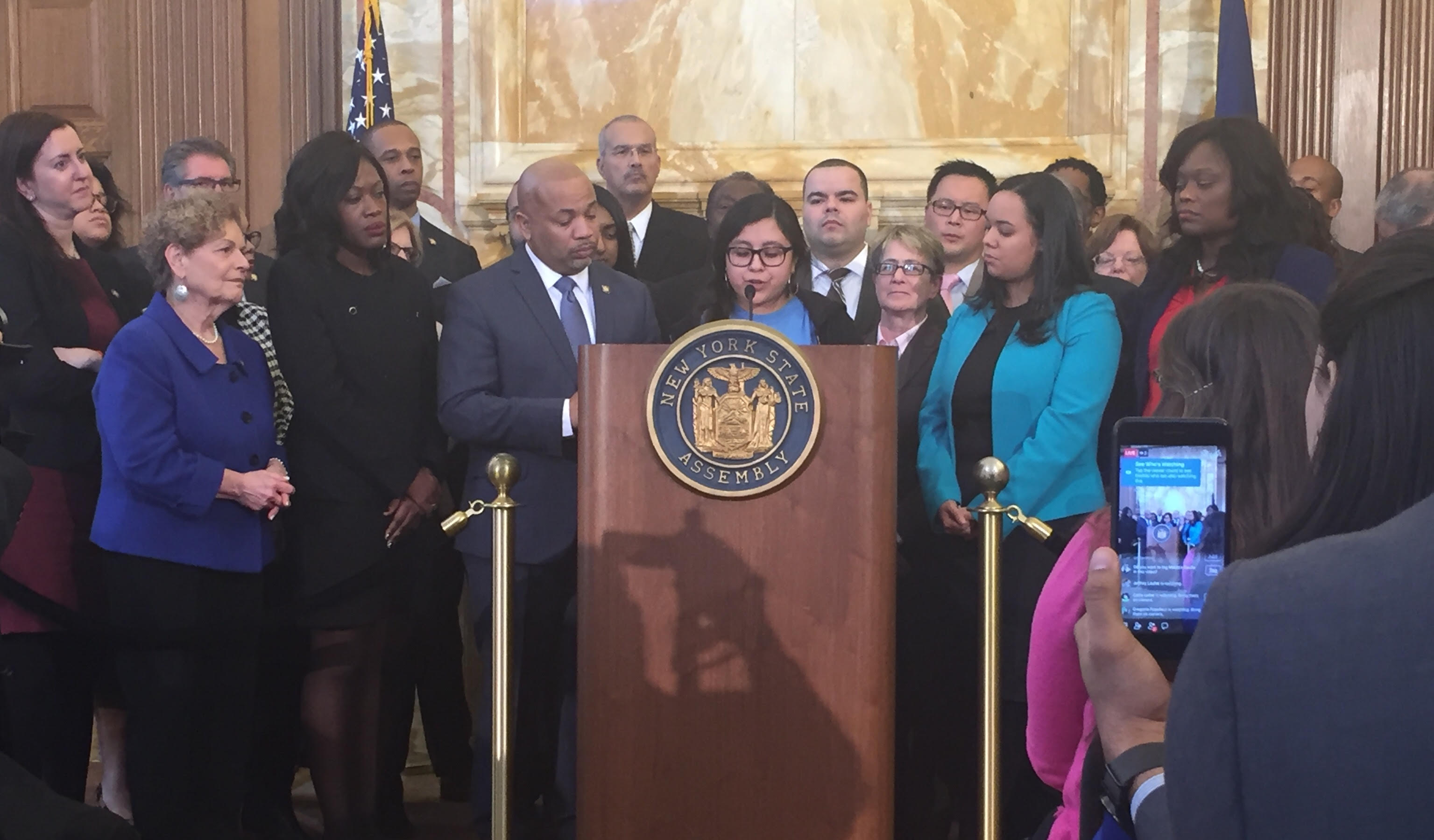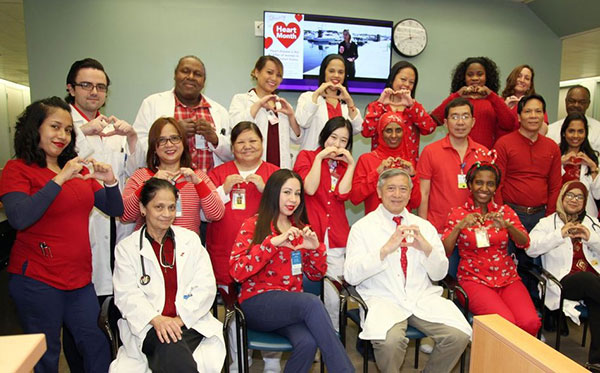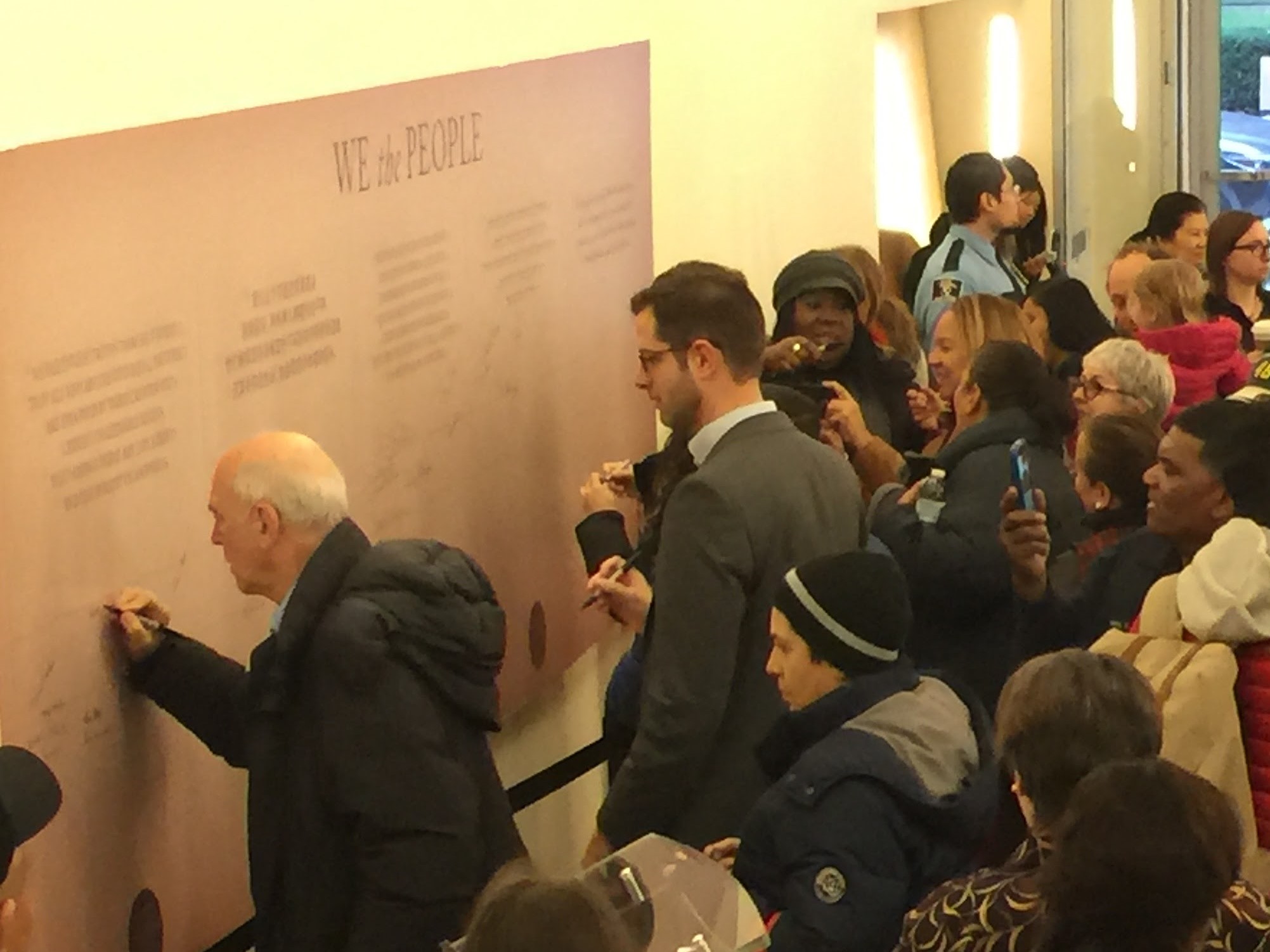This Must Be The Year For The New York Dream Act, A Game-Changer For Immigrant Youth Like Me

The author at a press conference in Albany for the Dream Act
On Monday the New York State Assembly passed the New York Dream Act. For immigrant youth like me, this legislation would be a game-changer.
I am a Dreamer. I came to this country at the age of two from Mexico. I am an American through and through. I have worked hard to get ahead. I’ve excelled in school. Without state tuition assistance, I worked throughout college to be able to pay tuition and other costs. Finally, last year, I graduated from City College. It was harder than it should have been, because I couldn’t get financial aid. Still, I overcame the obstacles.
But others face even harder situations. Too many undocumented students graduate from public high schools every year only to face the reality of not being able to go to college because they can’t get financial aid. It’s bad for immigrant youth, and it’s bad for New York, which loses out on having more future doctors, lawyers, teachers, and nurses—and the additional tax revenue that these professionals bring to our state. New York State Comptroller Thomas DiNapoli has found that Dreamers who obtain a bachelor’s degree would each pay more than $60,000 in additional state taxes over their working lives, which is far more than the maximum $20,000 state financial assistance that eligible students can get for that degree.
By passing the Dream Act today, members of the Assembly have shown once again that they understand the struggles that undocumented youth like me face. And we’re grateful to Speaker Carl Heastie, bill sponsor Assemblymember Carmen De La Rosa, and City Councilmember Francisco Moya, who led the work on this bill for many years when in the state Legislature.
The Assembly believes what I believe: everyone deserves equal access to college. It’s why I’ve worked for years to organize with other students like me at City College and Make the Road New York to pass the Dream Act. And it’s why today is a critical day in our fight for equality.
Now, we need to make sure this bill becomes law. We know that this fight won’t be easy. We know that conservative State Senators have blocked this bill before, and that many will spread misinformation about it once again to block our progress. But we’re committed to finally passing our bill in both chambers of the Legislature, and to have it signed by Governor Cuomo, who says he supports it.
With Donald Trump in the White House, we’re living in a new time—with mounting attacks from Washington against immigrant youth and families. And, in this time, it’s up to New York to take bold action to offer protection and equal opportunity for all. The Dream Act is a critical way for our state to lead the way in defense of immigrant communities.
Immigrant youth like me are Americans in everything but paper. We go to school here, our families and communities are here. New York should finally pass the Dream Act to ensure that we are treated like the rest of our peers—and that the doors of colleges and universities across this state are open to us.
***
Yatziri Tovar is a Dreamer and Media Specialist with Make the Road New York, the largest grassroots community organization in New York offering services and organizing the immigrant community. On Twitter: @YatziriTovar & @MaketheRoadNY.
***
Have an op-ed idea or submission for Gotham Gazette? Email This email address is being protected from spambots. You need JavaScript enabled to view it.
Community Health Centers, Essential But At Risk, Must Be Funded Now

Doctors and nurses (photo via @NYCHealthSystem)
It is no secret that a war is here – a war on immigrants, on LGBTQ people, and communities of color, on the 99%, and more. Health, a part of politics that affects all facets of life, has suffered a brutal onslaught. While some of 2017’s greatest grassroots successes were in defeating Affordable Care Act repeal efforts, recent federal tax overhauls and budget proposals threaten to further strain a healthcare system millions have come to rely on.
Lost in the conversation have been critical federal health programs like the Community Health Center Fund. Introduced as part of the original Affordable Care Act legislation in 2010, the Community Health Center Fund has come to represent 70% of federal grant funding for the nation’s community health centers.
Community health centers reaffirm the fundamental right to health for all. They provide health care for low costs regardless of age, ability to pay, insurance access, or immigration status. Community health centers are culturally responsive neighborhood clinics families rely on, not just for primary care but also for specialized services like dental, vision, and behavioral health. Without the full funding they and the communities they serve have come to depend upon, these centers may not be able to serve their patients to their full ability.
The Community Health Center Fund was renewed for two years in 2015 as part of the funding renewal for the Children’s Health Insurance Program (CHIP) – and in September, these programs and others expired. The last continuing resolution to address this issue, signed by President Trump on December 22, included short-term renewal funding of CHIP, community health centers, and other vital health programs. However, this resolution provided only a portion of the funds these programs need to operate at full strength, and only through March, thus jeopardizing their long-term sustainability.
While the latest continuing resolution reopening the federal government through this Thursday, February 8, included a six- year renewal of CHIP, community health centers were one of several health initiatives that were surprisingly left once again without any updates. Thus, thanks to Congressional inaction, anywhere between 10 and 50 percent of revenue dollars for over 400 New York City and over 700 New York State community health centers serving 2.2 million residents across the state, is now at risk.
FPWA counts community health centers among its member agencies and coalition partners across New York City – and these organizations are alarmed at this political failure.
Community Healthcare Network (CHN), which includes 14 community health centers and a fleet of mobiles operating across four boroughs, says that while CHN centers are not at risk of cutting services or staff, cuts to funding will force many centers in New York to curtail care. Care for the Homeless, a social and health services provider that includes substance abuse among its treatment focuses, believes that without federal funding, health centers may have to consider cutting less financially-sustainable services like Medication Assisted Treatment, a tactic critical to combating the opioid epidemic.
Without the Community Health Center Fund, New York City will lose over $88 million in 2018, affecting more than a million patients. In addition, Medicaid and CHIP patients make up 50% of patients served at health centers - and threats to these programs also threaten these centers. While losing this money doesn’t necessarily mean these centers will close, it does impact what services they’re able to provide, how many hours they are able to put in, how many people they can staff, which puts more pressure on the resources they have left. It also limits patients’ other options – and taxes those other options significantly by forcing these other health providers, such as New York City’s fiscally-challenged public hospitals, to provide potentially uncompensated care. This isn’t responsible, nor is it healthy.
Recent Capitol Hill rumors indicate that community health center funding would be addressed in the next round of budget negotiations in the coming weeks. But these centers, and the communities they serve, have been waiting long enough.
For many Americans, health care is anything but routine. When you’re forced to make the choice between your family’s dinner or your dentist co-pay, between your MetroCard for the week or your prescription glasses, what might you choose? Health shouldn’t be a privilege – it should be a norm. Community health centers validate that right every single day.
Congressional legislative efforts and comments over the past few months have made it clear – the Trump administration wants tax cuts for the wealthy now at the expense of programs that help everyday Americans access affordable care while still making ends meet.
Renewing federal funding for community health centers and other health programs is absolutely a priority and it should have happened by now. It must happen immediately.
Tuesday, February 6, is a nationwide Day of Demonstration for America’s Health Centers. Centers have been waiting for over four months to get their federal funding renewed and we need to do everything in our power to get this prioritized in the next piece of budget legislation.
It was a battle to keep CHIP and the Affordable Care Act alive – but the war on health isn’t over. As an umbrella organization for New York social services agencies with strong ties to community health centers, FPWA urges all New Yorkers to not let our health care fall victim to politics.
Call your senators and representatives – tell them to demand legislation that fully funds the Community Health Center Fund and other crucial health programs now without jeopardizing the health of millions.
***
Winn Periyasamy is a health policy analyst at FPWA, an advocacy and anti-poverty nonprofit based in New York. On Twitter @FPWA.
***
Have an op-ed idea or submission for Gotham Gazette? Email This email address is being protected from spambots. You need JavaScript enabled to view it.
Standing Up for Immigrants in Your Neighborhood

We The People
When the President recently reportedly referred to El Salvador, Haiti, and African nations as “s***hole countries,” it once again served as a reminder of the rampant prejudice and discrimination experienced by immigrants and ethnic minorities. And as the livelihoods of 800,000 young Dreamers living in our country hangs in the balance, we need to support immigrants now more than ever.
At Educational Alliance (EA) – the social service provider and network of community centers I lead on the Lower East Side and East Village – we have dedicated much of the past year to ramping up our programs and services for immigrants. The demographics of the Lower East side have changed since EA was founded 128 years ago, but the challenge is the same: immigrants need help adjusting to American life. We believe that our successful “We the People” initiative this past year can serve as a model for the rest of the city.
In the wake of the 2016 presidential election, we saw a substantial rise in hate crimes. Here in New York, hate crimes increased by 24% from the previous year, with a major proportion of the rise the result of bias crimes against Muslims and LGBTQ people.
So at EA, we launched We the People as a way of promoting inclusiveness and protection from the hateful and divisive rhetoric targeted at vulnerable populations. We knew that the President’s attacks on immigrant communities would only increase in time, so it was important to show immigrants in our community that there was a safe space they could go to for information and help.
Within a week after taking office, President Trump signed the infamous travel ban, prohibiting travel from seven predominantly-Muslim countries to the United States, sending a clear message that immigrants from Muslim countries don’t belong in our country.
We were ready. Under We the People, we worked with local businesses to identify themselves as welcoming to immigrants, and began training people to be “upstanders,” giving them the tools they need to effectively stand up for justice and intervene in conflict if they witnessed discrimination or attempts to bully our immigrant Muslim brothers and sisters.
Soon after, Trump issued an executive order stating that cities that refused to comply with federal immigration authorities would be ineligible to receive federal grants. And soon after, he rescinded the Deferred Action for Childhood Arrivals (DACA) program, placing hundreds of thousands more lives in limbo and in danger of being separated from their family, friends, and colleagues. Though both actions were halted by the courts, the aggressive stance towards immigrants undoubtedly had a chilling effect on their comfort in seeking services or reporting crimes.
But not in our neighborhood. Our partnerships with businesses and other local community groups early on helped spread the word that EA had the community’s back and that this was a place they could turn to for help. Under the initiative, we began to host a series of events, workshops, and community forums, including “Know Your Rights” events where we provide people with access to information on immigration fraud, rights, and legal services.
In the coming year, we will continue this work, investing in programs and services where we can be most impactful and joining together with local residents and businesses to ensure that our community remains safe and supportive for people of all backgrounds.
That’s because regardless of just how divisive and discriminatory our national leaders are towards immigrants and vulnerable communities, we will stand strong – as we have for 128 years – for all people, regardless of race or religious creed.
***
Alan van Capelle is President and CEO of Educational Alliance, a social service provider for the Lower East Side and East Village.
***
Have an op-ed idea or submission for Gotham Gazette? Email This email address is being protected from spambots. You need JavaScript enabled to view it.




